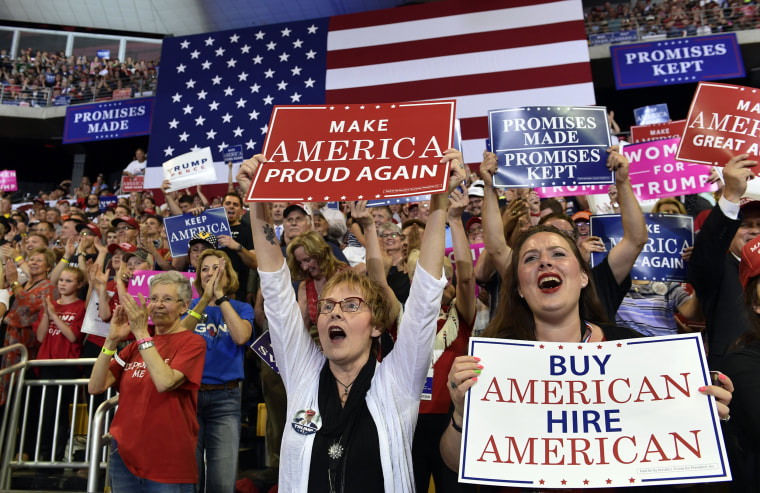DULUTH, Minn. — President Donald Trump defended the decision to suspend his policy of detaining undocumented children and their parents in separate facilities here Wednesday, just hours after he signed an executive order implementing it.
"We’re going to keep families together," Trump said. "But the border’s going to be just as tough as it’s been."
Later, he said of undocumented immigrants, "We’re sending them the hell back."
The crowd inside the Amsoil Arena cheered his take on the executive order, but several Trump fans who spoke to NBC News before the rally said they preferred that the separation policy had remained in place.
"I think he should have stuck by the original plan," said Ike Leno, 58, of Willow River, Minnesota. "Obviously it's not good to separate families, but they knew that was going to happen when they took this venture on."
Trump talked about policy — job numbers, his negotiations with North Korea and tax cuts in addition to immigration — but he was here for politics, for his re-election campaign.
Unlike other recent campaign events, held in states he won in 2016, the rally here represented Trump’s ambition to expand his electoral coalition in 2020. He lost the state of Minnesota by less than 2 percentage points two years ago.
"We came this close to winning the state of Minnesota and in two and half years it’s going to be really easy, I think," he said. "I needed one more visit, one more speech. That’s why — never give up, never, ever give up."
It might not be easy, but Trump has a point about his chances of winning in a state historically dominated by Democrats. In the counties surrounding this city, he made a significantly better showing than Republican nominees of the recent past, and a small shift in his favor here in 2020 could foreshadow a victory statewide.
“This is a very similar conversation to the reporters who called me and asked me why the president was in Wisconsin and Michigan and ‘Are you high about Pennsylvania?’ ” 2016 Trump campaign aide Michael Caputo said when asked whether Trump could flip Minnesota. “The president has data that helped him win the presidency in areas that everyone thought were off limits, that Hillary Clinton didn’t even go.”
It makes sense that Trump would travel north of the Twin Cities to this mining region along Lake Superior, which has a competitive House race in November’s midterm elections, Caputo said.
“In that close of a district, in that close of an area, I could see where some of the president’s advisers and the president himself might see it as an interesting political challenge,” he said.
The Duluth area is right across the border from Wisconsin, which Trump won narrowly in 2016, and much of the crowd at Wednesday night’s rally had crossed the line from the Badger State to cheer the president.
More immediately, Minnesota features four of the nation’s most competitive House districts, including what may be the two best pickup opportunities for a Republican Party that is generally playing defense across the country.
Trump nodded to those races briefly in his speech.
"A vote for a Democrat in Congress is really a vote for Nancy Pelosi," he said of the House minority leader, who is hoping to become House speaker again.
Here in Duluth, the Democratic incumbent, Rep. Rick Nolan, is retiring. Pete Stauber, a 20-year veteran of the city’s police force, is the GOP’s choice to succeed him. And he has a head start against the Democrats, who will run a five-way primary in August.
The Cook Political Report rates both that race and the one in the state’s southern First Congressional District, where Democrat Tim Walz is running for governor, as the only Democrat-held tossups in the nation.
Meanwhile, Democrats are hoping that suburban dissatisfaction with Trump will hand them the Second and Third districts in the Twin Cities area. Republican Rep. Erik Paulsen won re-election in the Third District by 14 percentage points in 2016, but Hillary Clinton took the district by 10 points at the presidential level and Democrats have a well-funded challenger in millionaire liquor heir Dean Phillips.
The Second District features a rematch between freshman Rep. Jason Lewis, a Republican, and Democrat Angie Craig. Lewis won Round 1 by less than 2 percentage points.

These GOP-held districts are also classified as pure tossups by the Cook Report, meaning that 1 in 6 such races nationwide are located in Minnesota.
“The way we see it is that every district is a little purple,” said Rachael Grooms, the communications director for the Minnesota GOP.
Her boss, state Republican Party Chairwoman Jennifer Carnahan, said Wednesday at the Trump rally that it is Minnesota’s “turn” to flip from blue to red like nearby states have in recent years.
“Let’s show the world that there is no blue wave coming here in Minnesota,” Carnahan said.
And while Republicans hope that Trump’s visit here will help energize GOP voters ahead of the midterm elections, Democrats say they don’t mind seeing him in the state at all.
“It is also going to have an equal effect on the rest of the state,” state Democratic-Farmer-Labor Party Chairman Ken Martin said. “It is going to fire up Minnesotans especially with what is happening at our border: trade wars.”
Trump’s tariff battle with Canadian Prime Minister Justin Trudeau could “really hurt people here, especially in agriculture,” said Martin.
That particular issue was on the mind of soybean farmer Patrick Blatz from Rush City, Minnesota, as he waited in line for the Trump rally here.
“Prices dropped big money in the last couple of weeks,” Blatz said. “It’s hit us — tens of thousands of dollars.”
Asked whether that could change his support for Trump, Blatz said it could.
“Not yet,” he said. “If it puts me out of business, it might.”
Jonathan Allen reported from Duluth, and Lauren Egan from Washington.